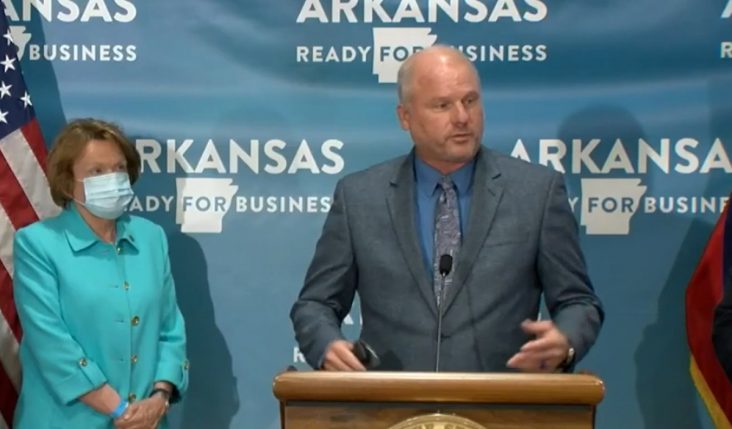Executive orders to provide liability immunity for businesses during COVID-19 pandemic
by June 15, 2020 3:08 pm 2,343 views

File photo: State Sen. Jim Hendren, I-Gravette, at a 2020 press conference on COVID-19.
Gov. Asa Hutchinson on Monday (June 15) signed three executive orders that bypass legislation and expand COVID-19-related civil liability immunity for businesses and make provisions for workers to seek compensation if infected on the job.
Hutchinson said a majority of Arkansas House of Representatives and Senate members supported legislation to provide liability immunity, but there was “a number of members who wanted the legislation that said, ‘We really don’t want to have to have a special session’ …” during the pandemic. Senate President Pro Tem Jim Hendren, R-Gravette, said 23 of 26 Republicans in the Senate – there are 35 members of the Arkansas Senate – supported executive orders instead of a special session.
However, there are no documents supporting the claim that a majority of House members supported an executive order instead of a special session. House Majority Leader Austin McCollum, R-Bentonville, sent a letter to the governor on June 12 asking for a special session. That letter was signed by himself and 38 other Republican House members. There was no mention in that letter of a preference for executive orders. The House has 100 members, with 76 Republicans and 24 Democrats.
Following are some of the items in the three executive orders Gov. Hutchinson signed Monday. Gov. Hutchinson said the executive orders can be reviewed when the General Assembly convenes in January.
• All businesses and their employees shall be immune from civil liability as a result of exposure to COVID-19.
• Immunity does not apply to willful, reckless or intentional misconduct.
• A presumption that the actions are not willful or reckless if the business owner substantially complies with public health directives.
• Immunity begins effective immediately.
• Healthcare workers and providers are authorized to use crisis standards of care to treat COVID-19 patients.
• Healthcare emergency workers are immune from civil liability.
One of the three orders expands Workers Compensation coverage for employees, with COVID-19 now considered an occupational disease. To receive benefits, there must be a causal connection between employment and contracting the disease.
Gov. Hutchinson and Senate President Pro Tem Jim Hendren, R-Gravette, said the executive orders do not protect “outlier” or bad actor businesses that do not follow public health guidelines issued by the U.S. Centers for Disease Control and Prevention (CDC).
“The purpose of this legislation is to allow the outliers to still be dealt with, but also to give some certainty to the people who are doing their best to try to survive during these challenging times. We’re talking about barbershops and gyms and hairdressers and nail salons; people who have one or two or three employees who with one frivolous lawsuit, when they were doing their best to comply, could be the final nail in their coffin,” Hendren said.
Gov. Hutchinson said Monday the executive orders were a “General Assembly-initiated effort,” but a call for such orders has been part of reports from his Economic Recovery Task Force. On May 26, Task Force Chair Steuart Walton said a common theme during task force meetings was the need for employer liability protection as employees return to workplaces. He said not having more immunity for employers could be a “potential drag” on the ability to recover because of a “large degree of uncertainty in this area.”
“While there is not a perfect solution there, we are setting out a few recommendations here for the governor and we’re happy to stand by and work with him to find a solution here that helps provide some certainty and some clarity for the businesses and the institutions beginning to work again in Arkansas in this new environment,” Walton said during a May 26 press conference.
The governor’s action was not well received in all circles. The Arkansas Trial Lawyers Association said they appreciate Gov. Hutchinson’s “steady leadership during the COVID-19 health crisis,” but “not a single COVID-19 tort lawsuit has been filed in Arkansas; there simply is no crisis.”
“The Arkansas Constitution is very clear. Only the voters can limit the right to seek justice when a wrong has been committed. Our organization will continue to work respectfully and in good faith with elected officials on these important policy discussions regarding the civil justice system. We will also continue to do all we can to safeguard the constitutional rights of every Arkansan,” noted the ATLA statement.
The Democratic Party of Arkansas said it is against “letting businesses avoid responsibility for endangering their staff and customers.”
“If a business, like a nursing home, has immunity it means they aren’t really required to do what’s right to protect their staff and patients. It means nursing homes won’t be held responsible if they fail to do what’s right and someone gets sick as a result.” DPA Chairman Michael John Gray said in a statement. “It’s basically forcing people to go into unsafe working conditions, without having the right to do anything about it – even if they fall ill. Leaders in Arkansas need to start valuing responsibility instead of giving bad faith employers excuses to do wrong. It’s pretty telling the Legislature wants to rush a Special Session for business immunity, but can’t do much of anything to support working people through COVID-19, to support education this Fall, or to make necessary changes to policing and criminal justice. Fortunately, voters are taking notice.”
